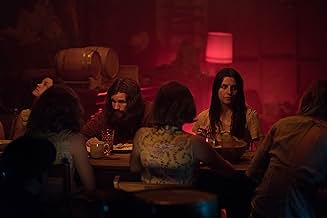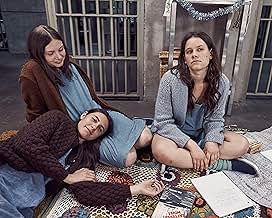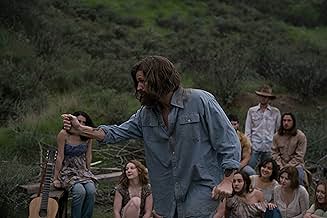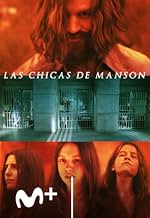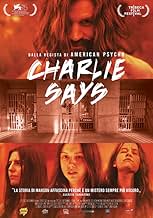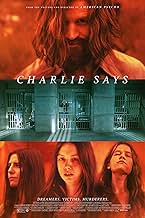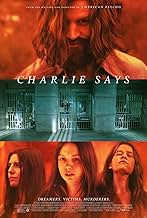IMDb-BEWERTUNG
5,9/10
5759
IHRE BEWERTUNG
Die tragische Geschichte eines allamerikanischen Mädchens, das im Sommer 1969 in einen kaltblütigen Mörder verwandelt wurde.Die tragische Geschichte eines allamerikanischen Mädchens, das im Sommer 1969 in einen kaltblütigen Mörder verwandelt wurde.Die tragische Geschichte eines allamerikanischen Mädchens, das im Sommer 1969 in einen kaltblütigen Mörder verwandelt wurde.
- Auszeichnungen
- 1 Nominierung insgesamt
Empfohlene Bewertungen
"Charlie Says" is ultimately a white wash of the horror committed by the Manson Family--it features the roles of the females in two of our nation's most gruesome and horrifying slaughter of completely innocent people to date which no one will forget--least of all the victims' families.
The true facts of the atrocities committed by the Manson Family (including the three women featured in this movie) and historical events are either omitted or not nearly accurate in the movie--the facts and events have been tweaked, whitewashed, slanted to tilt the viewers' feelings towards sympathy for the three Manson women rather than towards legitimately earned feelings of horror, shock, and disgust for the heinous murders they committed.
The movie shows Charlie Manson as the leader of these misfit women of the Manson Family supposedly by using mind control but this was not clearly shown as the women did have freedom and were free to leave. So, the power of mind control theme in the movie falls apart here. One is left to think that these women of the Manson Family went from a herd mentality of sociopaths to psychopathic murderers willingly--just following the herd.
The movie is not great, by a long shot.
The true facts of the atrocities committed by the Manson Family (including the three women featured in this movie) and historical events are either omitted or not nearly accurate in the movie--the facts and events have been tweaked, whitewashed, slanted to tilt the viewers' feelings towards sympathy for the three Manson women rather than towards legitimately earned feelings of horror, shock, and disgust for the heinous murders they committed.
The movie shows Charlie Manson as the leader of these misfit women of the Manson Family supposedly by using mind control but this was not clearly shown as the women did have freedom and were free to leave. So, the power of mind control theme in the movie falls apart here. One is left to think that these women of the Manson Family went from a herd mentality of sociopaths to psychopathic murderers willingly--just following the herd.
The movie is not great, by a long shot.
Based on the novel 'The Family' by Ed Sanders, this is one of three films in which Charles Manson featured in 2018, and a film about the Moors Murders would complete a trilogy by director Mary Harron beginning with 'I Shot Andy Warhol' depicting women provoked into irrational violence by an unwarranted infatuation with a weird control freak (Brady and Manson both had in common with their idol Adolf Hitler that they possessed the egotism and disdain for convention of great creative geniuses but not the actual creativity).
There's a surprising amount of God talk by Manson and his coven, and for once the current fashion for swaying steadicam photography suits the lack of balance shown by this unholy trinity of impressionable young ladies.
There's a surprising amount of God talk by Manson and his coven, and for once the current fashion for swaying steadicam photography suits the lack of balance shown by this unholy trinity of impressionable young ladies.
Charlie Says is yet another take on the Manson cult/murders, but it offers a fresh perspective using a unique method of storytelling. Whereas most media about the Manson family focuses on the murders, Charlie Says is told from the perspective of the.women involved in the crimes, particularly Leslie "Lulu" Van Houten (played by Hannah Murray), and its main concern is the build-up to the crime and the aftermath. Director Mary Harron shines a spotlight on life in the cult, Manson's charming but increasingly crazed antics, the ease of brainwashing lost and traumatized youths, and the difficulties in getting these women to see their crimes for the horrific acts they truly were.
The biggest draws of the film for me were some of its actors. Matt Smith plays Charles Manson to perfection, highlighting his charisma, eccentricities, and slow spiral into increasing violence; wisely, the cracks in his charismatic armor start small and widen over time, once his followers are already sucked into his version of the world. He is at once irresistibly charming, intriguing, and yet off-putting and fearsome, showing moments of love, care, and other moments of domestic abuse and overt control. Merritt Wever plays Karlene Faith, a graduate student sent to the Manson women in prison in order to give them an education, and she serves as a mirror for the audience as she struggles to understand the women's continued insistence that they believe Charlie's visions will come to pass despite all evidence and odds. Merritt's disbelief and overwhelming frustration is played wonderfully, as is her struggle with seeing these women as both murderers and lost souls who were taken advantage of by one of America's most infamous cult leaders. Finally, Sosie Bacon plays Patricia "Katie" Krenwinkel, one of the Manson women, and goes through such believable phases of intense emotion, both in and outside of the cult.
Some reviewers have stated this movie seeks to empathize with the killers, and I found that to be untrue. These women are guilty; there is no doubt about that, and the movie does not argue otherwise. In fact, the climax of the film sees the women having to face the fact that they did horrific crimes because they were told to, not because they had to. Karlene even says earlier in the film that by making them understand that, she will essentially doom them to bear that weight the rest of their lives. She is conflicted over this, but the movie never dares suggest that isn't what they deserve. Still, people are not so easily defined, and the movie makes the case that women who are victims in one sense (of brainwashing and a cult) can also be perpetrators in another (burglary and murder), and the two identities can absolutely be connected. It is worth questioning how that connection is made and what we can do as a society to keep the traumatized from becoming abusers themselves.
As for negatives, one or two line readings from the lead actress, Hannah Murray, were stale and could have been delivered better. While I mentioned this movie does not glorify the crimes, it does have two scenes of violence relating to a few of the murders for those who wish to skip true-to-life violence. Like most depictions of the Manson family, a little "too" much attention is given to Sharon Tate versus all the other victims, though that isn't much of a negative because she is in the movie for a total of two minutes or less. She was beautiful and famous, yes, but let's not forget the others who senselessly lost their lives to this cult.
Overall, Charlie Says is a welcome addition to the media about the Manson family, if only because it has new questions to unwrap and perspectives to offer. I almost skipped it because of its mind-boggling lower score, but I'm glad I didn't. It became my favorite Mansion family-related movie to date. I highly suggest you give it a watch if you are interested in the Manson family, true crime, or cult behavior.
The biggest draws of the film for me were some of its actors. Matt Smith plays Charles Manson to perfection, highlighting his charisma, eccentricities, and slow spiral into increasing violence; wisely, the cracks in his charismatic armor start small and widen over time, once his followers are already sucked into his version of the world. He is at once irresistibly charming, intriguing, and yet off-putting and fearsome, showing moments of love, care, and other moments of domestic abuse and overt control. Merritt Wever plays Karlene Faith, a graduate student sent to the Manson women in prison in order to give them an education, and she serves as a mirror for the audience as she struggles to understand the women's continued insistence that they believe Charlie's visions will come to pass despite all evidence and odds. Merritt's disbelief and overwhelming frustration is played wonderfully, as is her struggle with seeing these women as both murderers and lost souls who were taken advantage of by one of America's most infamous cult leaders. Finally, Sosie Bacon plays Patricia "Katie" Krenwinkel, one of the Manson women, and goes through such believable phases of intense emotion, both in and outside of the cult.
Some reviewers have stated this movie seeks to empathize with the killers, and I found that to be untrue. These women are guilty; there is no doubt about that, and the movie does not argue otherwise. In fact, the climax of the film sees the women having to face the fact that they did horrific crimes because they were told to, not because they had to. Karlene even says earlier in the film that by making them understand that, she will essentially doom them to bear that weight the rest of their lives. She is conflicted over this, but the movie never dares suggest that isn't what they deserve. Still, people are not so easily defined, and the movie makes the case that women who are victims in one sense (of brainwashing and a cult) can also be perpetrators in another (burglary and murder), and the two identities can absolutely be connected. It is worth questioning how that connection is made and what we can do as a society to keep the traumatized from becoming abusers themselves.
As for negatives, one or two line readings from the lead actress, Hannah Murray, were stale and could have been delivered better. While I mentioned this movie does not glorify the crimes, it does have two scenes of violence relating to a few of the murders for those who wish to skip true-to-life violence. Like most depictions of the Manson family, a little "too" much attention is given to Sharon Tate versus all the other victims, though that isn't much of a negative because she is in the movie for a total of two minutes or less. She was beautiful and famous, yes, but let's not forget the others who senselessly lost their lives to this cult.
Overall, Charlie Says is a welcome addition to the media about the Manson family, if only because it has new questions to unwrap and perspectives to offer. I almost skipped it because of its mind-boggling lower score, but I'm glad I didn't. It became my favorite Mansion family-related movie to date. I highly suggest you give it a watch if you are interested in the Manson family, true crime, or cult behavior.
This movie shows a side of the story that hasn't been depicted before. That is enough to appreciate the premise.
Charles Manson was a very sexist and racist man. He used, manipulated, and brainwashed both young women AND men who he could tell were naive and vulnerable.
Anyone who has thoroughly researched the Manson family will know the women were treated worse than in this film. One disturbing example is they weren't allowed to eat until after the dogs. Feminism was really at it's zenith in the late 60s. Representing feminism in the film is realistic to the time period.
These women would have never murdered had they not crossed paths with Charles Manson. Of that, there is no doubt in my mind. Many people were living in communes at the time. The members of "The Family" ended up in the wrong one, not knowing what lay ahead, not knowing they were being groomed by a sadistic madman.
This movie isn't excellent, but it does not deserve a 5.6. Voting it down because you don't like feminism is a very very sad point of view.
6.5/10
Charles Manson was a very sexist and racist man. He used, manipulated, and brainwashed both young women AND men who he could tell were naive and vulnerable.
Anyone who has thoroughly researched the Manson family will know the women were treated worse than in this film. One disturbing example is they weren't allowed to eat until after the dogs. Feminism was really at it's zenith in the late 60s. Representing feminism in the film is realistic to the time period.
These women would have never murdered had they not crossed paths with Charles Manson. Of that, there is no doubt in my mind. Many people were living in communes at the time. The members of "The Family" ended up in the wrong one, not knowing what lay ahead, not knowing they were being groomed by a sadistic madman.
This movie isn't excellent, but it does not deserve a 5.6. Voting it down because you don't like feminism is a very very sad point of view.
6.5/10
Kudos to the creative side for taking a look at this from the side of the female members of the Manson Family. As others have said it was just a little slow and didn't seem to get the most out of a pretty good cast. I don't think the film seeks to absolve the females of their guilt. I think they just tried to take an honest look at how vulnerable people can get indoctrinated. I would also disagree with those who call this a feminist movie, the movie does not seem to have any agenda just looks at these tragic murders from a different perspective. There is some nudity and sexuality which I think is necessary to accurately reflect the nature of the Manson Family Cult. As others have said, the movie is split between the flow of events in 68-69 and jail interviews after the trials. The jail scenes IMO are the best. The scenes at the ranches are a bit dark and tedious at times. There is one odd historical inaccuracy listed below.
WARNING ONE SPOILER: In the film, Manson accidentally meets Sharon Tate then immediately sends the family out to kill her. This accidental meeting did take place but was several months before the murders.
Wusstest du schon
- WissenswertesThe original Spawn Movie Ranch burned to the ground in a wildfire in 1970. The Spahn Movie Ranch in this movie was actually filmed at the nearby Corriganville Park in Simi Valley, California. Quentin Tarantino later filmed on the same set for the scenes set in Spahn Movie Ranch in Once Upon a Time In... Hollywood (2019).
- PatzerIn the film, Katie complains about the broken knife handle hurting her hand during the murders. It was actually Susan Atkins who said this.
- Zitate
Joan Didion: Many people I know in Los Angeles believe that the Sixties ended abruptly on August 9, 1969, at the exact moment when word of the murders on Cielo Drive traveled like brushfire through the community, and in a sense this is true. The tension broke that day. The paranoia was fulfilled. - Joan Didion, The White Album
- VerbindungenReferenced in Half in the Bag: Once Upon a Time in Hollywood (2019)
- SoundtracksLet It Be Me
Written by Jimmy Lloyd Head (BMI)
Published by J Mae Music Publishing (BMI)
Performed by Jim Head and the Del Rays
Courtesy of GpsSongs.com
Top-Auswahl
Melde dich zum Bewerten an und greife auf die Watchlist für personalisierte Empfehlungen zu.
- How long is Charlie Says?Powered by Alexa
Details
Box Office
- Bruttoertrag in den USA und Kanada
- 40.685 $
- Eröffnungswochenende in den USA und in Kanada
- 20.684 $
- 12. Mai 2019
- Weltweiter Bruttoertrag
- 98.240 $
- Laufzeit
- 1 Std. 50 Min.(110 min)
- Farbe
- Seitenverhältnis
- 2.35 : 1
Zu dieser Seite beitragen
Bearbeitung vorschlagen oder fehlenden Inhalt hinzufügen







